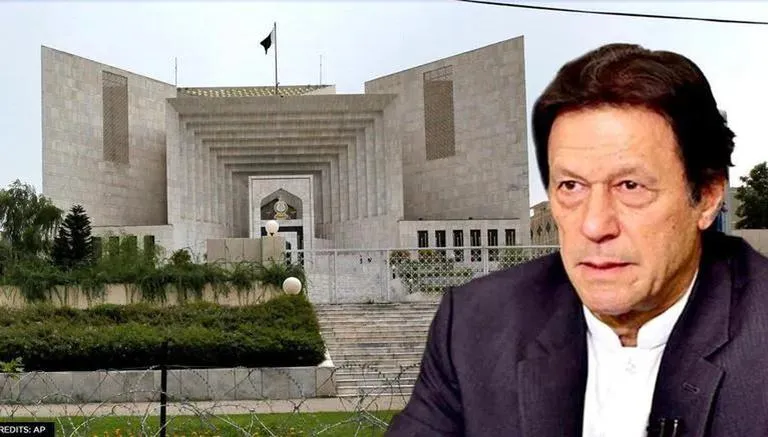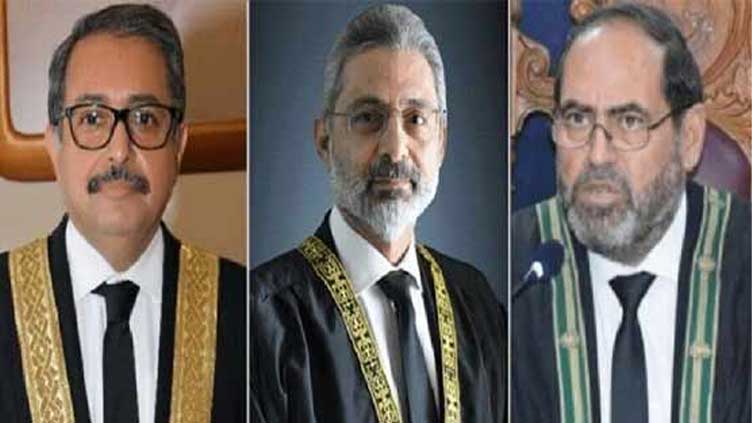
Judicial commission starts work, to make proceedings public
PTI Chief Imran Khan moves SC against incumbent gov’s formation of a judicial commission to probe recent audio leaks
The top court, in a case regarding former prime minister Benazir Bhutto, declared telephone tapping “against the fundamental rights”.
ISLAMABAD ( Web News )
Pakistan Tehreek-e-Insaf (PTI) Chairman and former prime minister Imran Khan moved the Supreme Court of Pakistan on Monday against the incumbent government’s formation of a judicial commission to probe the recent audio leaks.
According to an earlier notification issued by the Cabinet Division, a three-man judicial commission led by apex court’s senior puisne judge Justice Qazi Faez Isa and comprising Balochistan High Court Chief Justice Naeem Akhtar Afghan and Islamabad High Court Chief Justice Aamer Farooq.
The commission would probe leaked audio clips allegedly involving some current and former members of the superior judiciary and their family members to determine their “veracity” and “impact on the independence of the judiciary”.
The constitutional petition, filed by PTI Chief Imran Khan with the Federation of Pakistan and the Ministry of Interior as respondents, questioned if the federal government could select a judge of a superior court “on its own, to sit in any judicial commission” without the “prior sanction and approval of the chief justice”.
It further questioned what the effect of the formation of the commission by the federal government was, “without taking into consideration of the provision of Article 175(3) as well as the judgment delivered in Sharaf Faridi and others, where under the judiciary stands separated from the Executive for all purposes and intents”.
The petition asked if the commission could go into the details “of an alleged telephone taping” after the top court, in a case regarding former prime minister Benazir Bhutto, declared telephone tapping “against the fundamental rights”.

“Whereas under the Supreme Court judgment, the only thing left for determination is, that under what authority of law a telephone conversation of a judge of a superior court, a prime minister or their families, parliamentarians and political workers of a party duly registered with the Election Commission of Pakistan…can be tapped and what are the consequence of such unconstitutional and illegal phone tapping?”
It questioned whether the act of creating the commission did not “amount to a confession by a sitting regime that under their nose by telephone tapping, fundamental rights as given under Article 4, 9 and 19 are not violated”.
The plea continued that the “self styled terms of reference (TORs) framed” by the government were “politically motivated [and] aimed at effecting the independence of the judiciary and the institution”, adding that it was “an outright effort to circumvent and jeopardise the independence of judicator in the country and circumvent the enforcement of different laws of land”. “The notification is ultra vires to the Constitution and [the] law”.
The PTI requested that the top court declare the government’s notification as “ultra vires to the Constitution”.
It further prayed that “a judicial commission may kindly be constituted in the light of judgment passed” by the SC regarding the “illegal phone tapping…to meet the interest of justice”.
After questioning the government for the “deliberate omission” of the Terms of Reference (TORs), Pakistan Tehreek-e-Insaf (PTI) Chairman Imran Khan has challenged the formation of the three-member judicial commission probing the audio leaks pertaining to the judiciary in the Supreme Court.
Dr. Babar Awan, the PTI chief’s lawyer and party leader, filed the plea on his behalf requesting the court to declare the notification for constituting the commission null and void.
He argued that the proper forum for any probe or taking action against any judge was the Supreme Judicial Council. Imran Khan filed the petition through his counsel Babar Awan.
Judicial Commission pledges transparency
Earlier, the Judicial Commission said the proceedings of the probe body would be made public.
The inquiry commission, headed by Justice Qazi Faez Isa, said if any sensitive matter was brought before them, they would review the request for an in-camera action. The commission ordered the federal government to provide the email addresses and all relevant material.
The judicial commission started its proceedings in the Supreme Court building. The commission includes Justice Qazi Faez Isa, Islamabad High Court Chief Justice Amir Farooq and Balochistan High Court Chief Justice Naeem Akhtar Afghan.
Attorney General for Pakistan Usman Mansoor Awan appeared before the audio leaks commission. Justice Qazi Faez Isa inquired that under which law the commission was formed? The attorney general replied that the commission was formed under the Commission of Inquiry Act 2016.
The judicial commission said the proceedings on the issue of audio leaks would be made public. Justice Qazi Faez Isa said in his remarks that two elderly women were also included among those to be investigated. If requested, the commission would also go to Lahore for necessary action.
The commission directed the attorney general to provide the mobile phone numbers and SIMs of all concerned. It also sought email addresses.
Qazi Faez Isa said the commission would seek public help to provide information through advertisement. The information provider would have to reveal his identity and information received from unknown sources would not be acceptable.
The judicial commission asked the government to furnish it with all the audio recordings and said the federal government should provide all the material by Wednesday. The transcripts of all the audios had also been directed to be provided with the signature of a responsible officer.
The commission said if any mistake was found in the transcript, action would be taken against the officer concerned. The judicial inquiry commission said the names, positions and contact numbers of those whose audio leaks were under investigation should also be provided.
He said the inquiry commission was not Supreme Judicial Council (SJC) and there would be no interference in the jurisdiction of the council. He said the inquiry commission was not taking action against any judge and it would not do so in future.
He said the probe body had been established only to determine the facts. He said the commission would respect all the witnesses and hoped they would be respected too. The commission had the power to summon those who would not cooperate.
He said the commission would issue notices only and it would not issue any summons. He further said the government officers did not have room for denial in advance and an advertisement would be issued to seek help from the public.
Later, Justice Isa adjourned proceedings of the judicial commission for a week and directed the attorney general to issue notices to all the person concerned and ensure immediate compliance. Justice Isa said that when the notice would be received by the person concerned, its proof should be provided in the form of a photograph or signature.
The judicial inquiry commission also directed the attorney general to make arrangements for playing the audios during the proceedings and to determine the agency concerned to verify the audios. Justice Isa further said the Punjab Forensic Science Agency could be contacted to verify the audio leaks.
“If someone refuses to recognise his voice in the audio or says it is tampered with, it must be verified in advance,” said Justice Isa. He said, “A member of the forensic agency should be present during proceedings of the commission so that if a person refuses to recognise his voice, there is immediate verification.”

